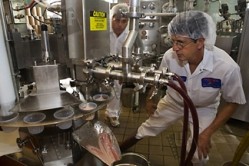‘Food for life’ programme proposes barrage of research

The formal launch of the Strategic Research & Innovation Agenda (SRIA) took place at Hotel Silken Berlaymont in Brussels yesterday. Proceedings were opened by ETP President Dr Mike Knowles.
The research projects supported by the platform includes investigation of technologies enabling the industry to extend its raw material base into areas such as insect-based foods.
Scientists are planning to look into replacing extraction with enrichment technologies to deliver key nutrients in the diet. In this way, rather than extracting small levels of nutrients from foods and re-adding them to products, manufacturers could enrich specific components in the food without destroying the carrier matrix.
Nano-formulations
Food grade nano-formulations for effective nutrient delivery are being explored, as are less invasive processing methods that minimise damage, nutrient loss and energy expenditure simultaneously. In-line and off-line ways to monitor and control food quality, including rapid testing techniques, are also being studied to support this.
Investigations are also being launched into the applicability of increased automation and use of robotics for unpackaged food processing.
Researchers plan to probe the area of sustainability and will look at sustainable packaging materials. They also aim to consider the reduction of energy in the cold and frozen chain for fresh foods by developing novel modified atmosphere technologies and smart/communicative packaging.
Plant-based technologies
In related analysis of sustainable processing, scientists will examine plant-based new technologies and raw materials, interdisciplinary work on efficient water use and more efficient processing techniques.
Holistic exploration of the transformation of waste into products for different sectors and the use of resources such as steam and electricity, as opposed to focusing on specific unit savings, is being undertaken.
Projects tackling the environmental impact and efficient use of novel non-thermal technologies to manufacture products have been initiated.
Downscaling and upscaling
In addition, researchers are investigating ways of downscaling industrial scale processing to the level of small-to-medium-sized businesses and households and upscaling traditional artisanal processes to deliver the same quality by mass production.
These research projects are a small flavour of what is being explored in the ETP ‘Food for Life’ programme. Other streams address areas such as sustainable and ethical production and food safety.
Established in 2005 under the management of trade body FoodDrinkEurope, ETP ‘Food for Life’ is an industry-led, public/private partnership encouraged by the European Commission to fuel collaborative innovation and knowledge transfer across the food chain. Seven research streams have been set up to co-ordinate project work, which is intended to be conducted up to 2020.
Speaking following the launch of the SRIA, Knowles said: “Research and innovation activities, such as those proposed by ETP ‘Food for Life’, help support the competitiveness of the European food and drink industry and also enable the industry to better respond to the needs of Europe‘s consumers to ensure their nutritional and lifestyle requirements are catered for. The new SRIA is therefore an important step forward in this respect”.





